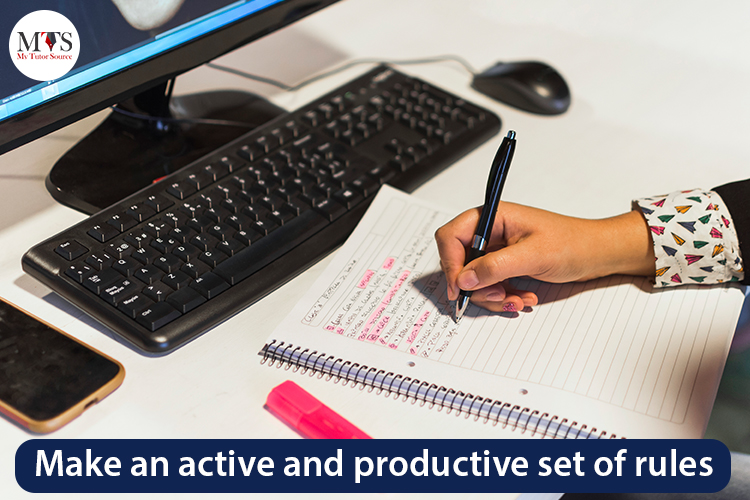

Not a single student would miss any chance to score best in exams while making time for their hobbies, family, friends, or sports and live a life with zero pressure of failing in exams and neglecting other life activities. Who doesn’t want to be organized and live a balanced life? But the real question is how to manage all the work in a day? And for this, students need to develop skills that govern their daily tasks effectively. Everybody gets the same hours a day; time is never finite or infinite for anyone. It’s all about how well you can manage your daily time span and organize it so that you don’t fall behind. Students make study plans when exams get near, this learning strategy works out for some, and some fail to follow it because they do not know how to manage their time effectively.
Time management is an essential skill to accomplish goals in life and is of utmost importance for a student’s successful career. Knowing how to manage the right things at the right time can dramatically improve productivity and performance and leads to a stress-free life. In this blog post, we have highlighted some worth learning l time management tips with their importance for students. Give them a read and start working on your time management skills!
Time is never too little or too much for anyone. It always depends on how one makes use of it. The whole universe gets the same 24 hours per day which is enough to achieve everything required. You must need to be realistic about time and make the most of it without blaming it and penalizing yourself. Realize the facts and review how you spend the 24 hours you get daily. Write down the activities you do every day, from waking up to going back to bed with the amount of time spent on them, and then make a list of things that you wish you do daily but couldn’t get enough time for whatever the reason.

Everyone has goals to accomplish in their life, so do you too. Make a list of your short-term goals and long-term life goals of your academics, like if your long-term goal is to get an A grade and the short-term goal is to finish assignments on time. Confused mindsets and unclear goals hinder the learning process. Now establish your priorities, break down your goals into flexible periods, don’t get hard on yourself. Set lower expectations and fulfill them first and then move to the higher ones. Manage your whole week’s tasks and review your progress on the weekend.

Measure your success and the amount of time you’ve spent on it, determine what more you can achieve in the coming week, and manage your next week’s time accordingly. Setting goals and prioritizing the important ones saves you from complexities, workload stress, and last-moment tasks.
Nobody knows your strengths and weaknesses more than you. You know better how much revision, preparation or time you need to finish planned tasks, which concepts need more time, and which environment is best for your learning. So, set some rules for yourself and manage your time so that you get at least 2 hours away from academics before going to bed. Alternate tasks according to their degree of complexity and your interest, make a rule of respecting your needs first, like taking a short healthy nap before completing the misunderstood tasks, set time limits for everything, rather than digging deep into one subject and neglecting others. Make sure you manage your time so that the results turn out productive and worth the time. Start early so you may not fall behind.
Consider the following tips for maximising your time and releasing your inner creative brilliance:
1. Wherever attention is directed, energy flows. If the tasks you need to complete are not aligned with what matters most to you – your core values – you will never have time to complete them.
2. Frequently, we allow ourselves to lose focus and be interrupted as a crutch when confronted with unpleasant emotions such as boredom, frustration, or a lack of interest. These are learned, addictive responses – and we can overcome them and alter our behaviour by developing effective time management skills rather than retreating when a task becomes difficult.
3. Set aside time for the most important project. Nobody is going to make room for you. It will, however, mean the difference between progressing and feeling stuck.
4. As difficult as it may be, we must focus exclusively on one project at a time and devote our full attention to it until it is completed. After that, we can make a different selection.
5. To minimise distractions while in the zone, turn off all non-critical notifications on your phone and laptop. A constantly ringing phone is not conducive to high-level creativity.
6. You’ve probably noticed that at certain times of the day, you’re as focused as an eagle, and your creativity soars. This occurs when your mind is perfectly in tune with the external circumstances.
7. When you surround yourself with creative individuals who take action and accomplish goals quickly, you will naturally adopt these habits and become more proactive in your studies. Identifying your flow or zone can make a significant difference in your time management.It assists you in attaining an optimal state of consciousness, which enables you to feel and perform at your best.
Prioritization and time management are mutually exclusive. You can manage your time effectively only if you are aware of when certain tasks should be completed. The objective is to undertake a difficult or time-consuming task, complete it, and then move on to other tasks.
Gulsaba, Growth Marketing APAC at QuillBot

Procrastination turns an individual into a lazy and unmotivated being. If you cannot manage your time and study plans alone, surround yourself with people having the same goals and study plans. The group study will encourage and motivate you, and this is how one can stay away from procrastinating things. Stay alert; procrastination is the worst enemy of your bright future and time management plans, leading to anxiety. Also, manage your time in a way that keeps your focus on one thing at a time, avoids multi- tasking. Divided attention takes you nowhere; drop the least important task later if they will not penalize you.
While creating a timetable or an entire week’s to-do list, don’t forget to take time for your friends, family, other activities, and especially yourself. Highlight the important events that are going to happen. Plan and make sure to manage your time in a way that you get to attend them. Don’t compromise on your diet, sleep hours, and health, mental and physical. If you are struggling hard in completing a task, take the help of your fellow or tutor. Don’t waste your time on something that can be done by following a witty life hack. Seeking advice can save your time and enhance your knowledge. Learn to live a healthy and balanced life.
While managing your daily routine and planning tasks, do not use your phone or other social media websites on your desktop to increase your work efficiency and productivity. Moreover, do not sit in a noisy area; keep unnecessary devices aside. If you have to use your phone for study-related work, then set timers. For example, after finishing a task within 20-30 minutes, you can use your phone for 5 minutes. And if you are attending an online lecture, don’t open social sites apps and keep your phone on silent so that nothing breaks your focus. Unfollow those who waste your time and energy.
1. Use a task management app to plan out your assignments and study time. A simple app (like TickTick, my favorite) can help students keep track of school assignments as well as all the other obligations they have. In addition to fitting into a student’s budget (i.e., free), it has an amazing set of features: reminders, great recurring settings, list, and calendar view, syncing to Google Calendar, etc.
2. Use the Pomodoro technique (a timer-based focus technique) to help ensure you take breaks during those marathon study sessions. It will also help you just get started on the stuff you’re dreading. Set the timer for 25 minutes, work uninterrupted, and when the timer goes off, reward yourself with a break!
Alexis Haselberger Productivity, Time Management and Leadership Coach
Don’t rush, and it is vital to know how to privilege the essential tasks. But don’t forget to take healthy breaks in between the tasks. Don’t take too many breaks; manage everything so that if you finish a chapter, you will walk for 5 minutes or grab a snack or give rest to your eyes or anything. Assign a task completion for a break. Before taking a break, you can write your next task on a note and stick it around the study area so you may not forget it after a pause.
Adapting time management skills will not only secure your academic results or turn you into a brilliant student, but it trains you for a better lifestyle. Its implementation will help you identify the essential tasks, plan better, set and achieve goals or objectives, differentiate one task from another, respect deadlines, and manage time optimally. These time management tips will help one live a balanced life without stressing over missed deadlines and undone tasks. William Shakespeare quotes the benefit of time management as:
“Better three hours too soon, than one minute too late.”